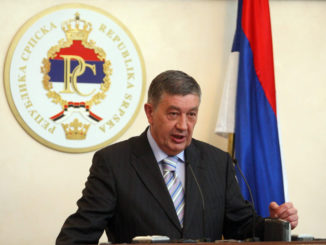By Drazen Remikovic for Southeast European Times
Islamic extremists recruiting fighters from the Balkans are increasingly seeking young women to take up arms, pulling them away from their families to participate in a conflict thousands of kilometres from home.
On April 11th, Interpol announced that two girls from Bosnia and Herzegovina (BiH) were missing, Samra Kesinovic, 16, and Sabina Selimovic, 15.
Recent photos on the girls’ Facebook pages show them brandishing Kalashnikov rifles, and in some pictures they are surrounded by armed men. In their latest postings they announced plans to marry so that they can become “holy warriors,” as, they wrote, “Death is our goal.”
Sabina’s father, Sabit, told the media he believes his daughter was kidnapped and taken from Vienna to Turkey.
“We have no information about our daughter, where she is now and how she disappeared in the first place,” Sabit Selimovic said.
The girls’ families are refugees from BiH who settled in Austria after the conflicts in the 1990s.
The families said the two girls had recently started going to a local mosque run by a radical imam, Ebu Tejma.
Experts said hundreds of fighters have gone from the Balkans to fight in Syria in the past several months, adding that Turkey is a “gate” for fighters from Europe.
“Girls are now cannon fodder for radical Islam, they are tricked and then simply taken there,” Dzevad Galijasevic, former director of the Southeast Europe Expert Team for the Fight Against Terrorism and Organised Crime, told SETimes.
“They had all the prerequisites to be jihad warriors: refugees, poverty, foreign country, hopelessness and despair. Recruitment centres are mosques that are the base of radical Islam. These girls are the most extreme example because of their age,” he added.
Hundreds of people from the Balkans, mostly from BiH, Serbia and Montenegro, have gone to Syria to join rebels fighting against President Bashar al-Assad’s regime.
Many countries in the region are in the process of taking legal action to sanction citizens who fight in foreign wars. BiH implemented a new law this week that calls for jail terms up to 10 years for any citizen who fights in a foreign war.
“However, the question is how effective the law will be given that the whole story is covered with a veil of secrecy, it is not known how many people went to Syria, it is not known how many were killed. It will be very difficult to break the chain of recruitment,” Dusanka Majkic, chairman of the BiH Parliamentary Committee for Defence and Security, told SETimes.
A similar law was proposed by the Social Democratic Party of Serbia (SDSP) in the beginning of the year. According to the law, the state will sanction recruiters with prison sentences of up to 12 years, and those who participate in foreign wars with prison sentences of up to five years.
Macedonia is also amending its criminal law to punish recruiters and citizens who participate in foreign military or paramilitary formations with prison sentences of up to five years.
Many are outraged by the news of people going to the Middle East to fight.
“I cannot believe that anyone finds it acceptable to let his kid visit some radical mosque. People should be aware that the chance of anyone returning from war is minimal. We, from the Balkans, know that very well,” Stefan Bocen, an electrical engineer from Mostar, told SETimes.
On April 25th, France President Francois Hollande said more than 800 French citizens have gone to Syria to fight, and that his country is making a plan to address the issue.
More than 140,000 people have been killed in Syria over the past two years, and more than 2 million Syrians have become refugees.
What can be done to dissuade citizens from fighting in Syria and other foreign wars? Add your opinion to the comments section. (SETimes)



